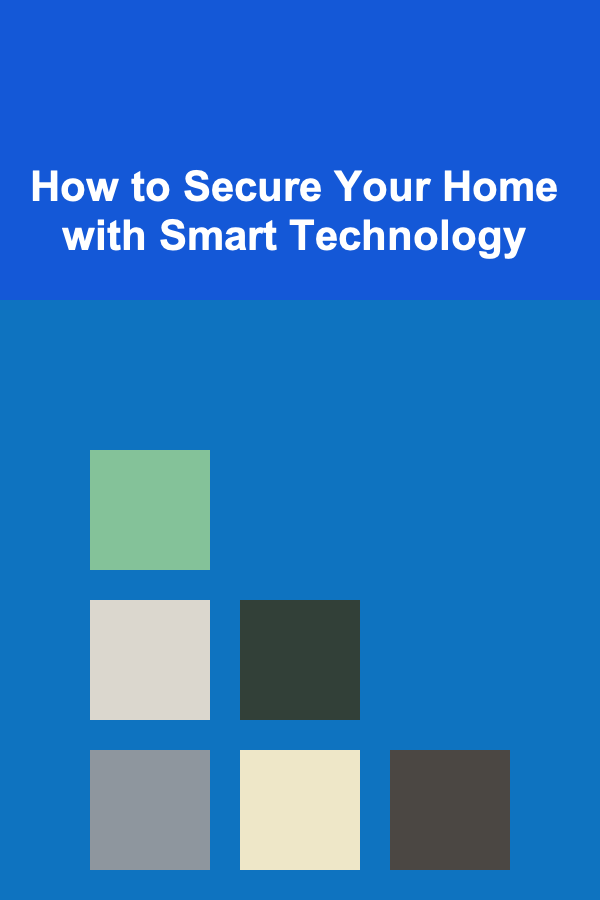
How to Secure Your Home with Smart Technology
ebook include PDF & Audio bundle (Micro Guide)
$12.99$8.99
Limited Time Offer! Order within the next:

As we move further into the 21st century, technology continues to shape the way we live, work, and interact with the world around us. One area where technology has made a significant impact is in home security. Traditional security systems, such as locks, alarms, and cameras, have evolved to become smarter, more efficient, and more accessible to homeowners. This shift has brought about the rise of smart home security systems, which leverage the power of the internet, artificial intelligence, and automation to create a comprehensive and highly effective security solution.
In this article, we will explore how to secure your home using smart technology, including the different types of smart security devices available, the benefits they offer, and how you can integrate them into your home for maximum protection. From smart cameras to doorbell systems, motion sensors, and smart locks, we'll discuss how these technologies work and how they can help keep your home safe from potential threats.
The Evolution of Home Security
Historically, securing a home meant relying on traditional methods like locks, deadbolts, and simple alarm systems. These systems were often reactive, only alerting homeowners when a break-in had already occurred. While these methods provided a basic level of protection, they lacked the ability to proactively prevent crime or allow homeowners to monitor their property in real-time.
With the advent of the internet and wireless technology, home security has evolved. Modern smart security systems offer real-time alerts, remote access, and automation, enabling homeowners to monitor and protect their property from anywhere in the world. The integration of artificial intelligence (AI) and machine learning has made these systems smarter, allowing them to detect potential threats more accurately and reduce the number of false alarms.
Smart home technology is now more affordable, user-friendly, and customizable than ever before. With a wide range of devices to choose from, homeowners can tailor their security systems to suit their specific needs and preferences. Whether you're looking for basic surveillance or a comprehensive, AI-driven security system, there's a smart solution for you.
Key Components of a Smart Home Security System
A smart home security system typically consists of several key components that work together to monitor and protect your property. These components can be easily controlled and managed through a smartphone app, voice assistant, or central hub. Below are some of the most common smart security devices and how they contribute to a comprehensive home security strategy.
1. Smart Security Cameras
Smart security cameras are one of the most popular and effective ways to monitor your home. These cameras can be placed both indoors and outdoors to provide live video feeds of your property. What sets smart security cameras apart from traditional ones is their ability to connect to the internet, allowing homeowners to access live video footage and recorded footage from anywhere using a smartphone or computer.
Key Features of Smart Security Cameras:
- High-definition video: Most smart cameras offer HD or 4K resolution, ensuring clear and detailed footage.
- Motion detection: Smart cameras can detect movement and send alerts to your phone when motion is detected in certain areas.
- Night vision: Many smart cameras come with infrared night vision capabilities, allowing them to capture clear footage in low-light conditions.
- Cloud storage: Video footage is often stored in the cloud, allowing for easy access and retrieval of past recordings.
- Two-way audio: Some cameras come with built-in microphones and speakers, allowing you to listen and speak to people near the camera through the app.
2. Smart Doorbell Systems
Smart doorbell systems, such as the Ring Doorbell, have become increasingly popular as part of home security setups. These devices combine a doorbell with a video camera, allowing homeowners to see and communicate with visitors at their front door through their smartphone or voice assistant.
Key Features of Smart Doorbell Systems:
- Live video feed: View who is at your door in real-time, whether you're home or away.
- Two-way communication: Speak to visitors through your smartphone or smart device without opening the door.
- Motion detection: Get alerts when someone is at your door or if there's movement near your entrance.
- Package detection: Some smart doorbells can detect when packages are delivered and notify you, helping you keep track of deliveries and reduce the risk of package theft.
- Integration with other smart devices: Many smart doorbells can be integrated with other security devices, such as cameras and locks, for a more comprehensive security solution.
3. Smart Locks
Smart locks provide keyless entry to your home and can be controlled remotely, providing greater convenience and security. With smart locks, you no longer need to worry about carrying keys or manually locking and unlocking your doors.
Key Features of Smart Locks:
- Remote access: Lock or unlock your door from anywhere using a smartphone app.
- Keyless entry: Use a code, fingerprint, or smartphone to unlock your door instead of traditional keys.
- Automated locking: Set your door to automatically lock after a certain period of time or when you leave the house.
- Guest access: Grant temporary or permanent access to family members, friends, or service providers without the need for physical keys.
- Security alerts: Receive notifications when someone locks or unlocks the door, providing an added layer of monitoring.
4. Motion Sensors
Motion sensors are a vital component of any smart home security system. They detect movement within a specific area and can trigger other devices, such as cameras, alarms, or lights, to respond accordingly.
Key Features of Motion Sensors:
- Sensitivity settings: Adjust the sensitivity of the sensor to avoid false alarms caused by pets or other non-threatening movement.
- Integration with other devices: When motion is detected, the sensor can trigger smart lights, activate cameras, or alert you to potential intruders.
- Smart notifications: Get real-time notifications when motion is detected in areas you want to monitor.
- Energy efficiency: Motion sensors can also be used for controlling smart lighting, turning lights on or off when movement is detected, saving energy when no one is present.
5. Smart Alarms and Sirens
Smart alarms and sirens are essential for notifying you and your neighbors of a potential break-in. These devices can be integrated into your overall security system and activated remotely in the event of a security breach.
Key Features of Smart Alarms and Sirens:
- Loud alerts: When a security breach is detected, the alarm will sound loudly, alerting anyone nearby to the threat.
- Remote control: Arm or disarm the alarm system remotely using your smartphone.
- Integration with other devices: The alarm can be linked to motion sensors, cameras, and other smart devices to trigger a full security response.
- Siren customization: Many smart alarms allow you to adjust the sound and duration of the siren to suit your needs.
6. Smart Lights
Smart lights are not only a way to enhance the ambiance of your home but also serve as a valuable security tool. These lights can be controlled remotely and set to turn on or off at specific times, simulating your presence even when you're away.
Key Features of Smart Lights:
- Automated scheduling: Set your lights to turn on and off at specific times to make it look like someone is home, deterring burglars.
- Motion-activated lighting: Trigger lights to turn on when motion is detected, illuminating dark areas and alerting you to potential intruders.
- Voice control: Use voice commands to control your lights through smart speakers or assistants like Amazon Alexa or Google Assistant.
- Integration with other security devices: Connect smart lights with cameras, alarms, or motion sensors for a coordinated security response.
Benefits of Securing Your Home with Smart Technology
Smart home security systems offer numerous benefits, making them an attractive choice for homeowners looking to improve their security. Here are some of the key advantages of using smart technology to secure your home:
1. Convenience and Control
With a smart home security system, you have full control over your home's security, no matter where you are. You can monitor live video feeds, lock and unlock doors, arm and disarm alarms, and receive alerts---all from your smartphone or tablet. This level of convenience allows you to stay on top of your home's security, even when you're away on vacation or at work.
2. Remote Monitoring and Alerts
Smart security systems offer real-time monitoring, enabling you to keep an eye on your property at all times. If any unusual activity is detected, you'll receive an instant alert, allowing you to respond quickly to potential threats. Whether you're on a business trip or simply at the grocery store, you can rest easy knowing you're always connected to your home.
3. Integration and Automation
One of the main advantages of smart home security is the ability to integrate various devices and create automated routines. For example, you can set your smart lights to turn on when motion is detected, activate your cameras, and send you an alert---all without lifting a finger. This level of automation makes it easier to maintain a high level of security with minimal effort.
4. Cost-Effective Security
While smart security devices may have a higher initial cost than traditional systems, they often save money in the long run. Many smart systems are subscription-free, meaning you don't have to pay for monitoring services like you would with traditional alarm companies. Additionally, the ability to remotely monitor your home can prevent costly damages or theft, making it a worthwhile investment.
5. Increased Safety and Peace of Mind
With the combination of real-time alerts, remote monitoring, and automation, smart technology provides homeowners with peace of mind. Knowing that your home is protected by advanced security features gives you confidence, whether you're home or away. The added safety measures can also deter criminals from targeting your property in the first place.
Conclusion
Smart home technology has revolutionized the way we protect our homes. By integrating devices like security cameras, doorbell systems, smart locks, motion sensors, and alarms, homeowners can create a robust and highly effective security system. The convenience, control, and peace of mind offered by these systems make them an attractive choice for anyone looking to enhance their home security.
As technology continues to evolve, so too will the capabilities of smart home security systems. With advancements in AI, machine learning, and automation, future systems will be even more intuitive and capable of providing an even higher level of protection. Investing in smart home technology is an investment in the safety and security of your home, your family, and your belongings.
Reading More From Our Other Websites
- [Organization Tip 101] How to Build a Tool Shed on a Budget
- [Home Cleaning 101] How to Make Your Own Eco-Friendly Cleaning Products
- [Home Family Activity 101] How to Create a Backyard Movie Theater for Family Fun
- [Organization Tip 101] How to Create a Smart System for Managing Home Projects
- [Personal Finance Management 101] How to Optimize Your Credit Utilization Ratio for Better Scores
- [Personal Financial Planning 101] How to Plan for a Financially Secure Future After Divorce
- [Organization Tip 101] What Creative Ideas Can Help You Organize Your Dining Room?
- [Paragliding Tip 101] The Evolution of Paragliding Competition: From Early Meets to Modern World Championships
- [Home Cleaning 101] How to Clean Your Dishwasher for Optimal Performance
- [Home Budget Decorating 101] How to Achieve Home Decor Under $100 for Your Space

How to Create a Laundry Room Cleaning Schedule
Read More
How to Ensure Your Pet's Mental Health at Home
Read More
How to Stage Your Home on a Tight Timeline Before a Showing
Read More
How to Track Your Spending with a Simple Budgeting Tool
Read More
How to Create a Weight Loss Planner for Emotional Eaters
Read More
10 Tips for Art Journaling for Relaxation
Read MoreOther Products

How to Create a Laundry Room Cleaning Schedule
Read More
How to Ensure Your Pet's Mental Health at Home
Read More
How to Stage Your Home on a Tight Timeline Before a Showing
Read More
How to Track Your Spending with a Simple Budgeting Tool
Read More
How to Create a Weight Loss Planner for Emotional Eaters
Read More